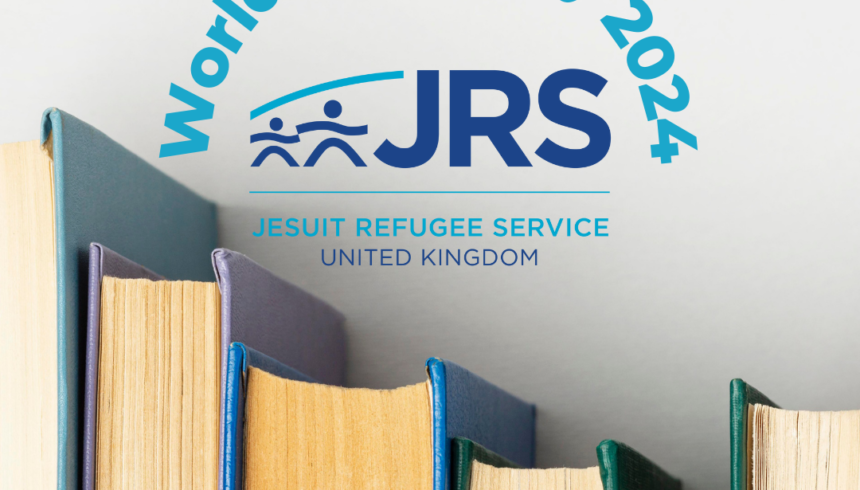World Book Day on 7th March is a wonderful occasion to celebrate the power of books and reading while also highlighting the diverse interests and backgrounds of the JRS UK community.
Below, we’ve assembled a list of recommendations from refugee friends and staff, ranging from cookbooks to children’s literature, fiction to non-fiction.
It’s a compelling selection and encapsulates the richness of human experiences and the universality of the written word. Have a skim through the varied books and see if any catch your fancy!
– Loddan
My First Book of protest by Julie Merberg and illustrated by Michéle Brummer Everett
Liam, Head of Communications, Fundraising and Advocacy
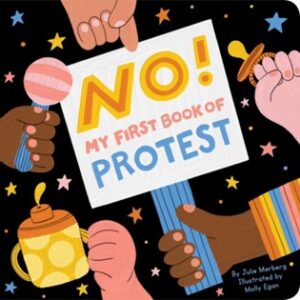 I’ve been reading My First Book of protest with my 2-year-old son Naoise. It’s a book for young children featuring different people who’ve campaigned for social justice including Frederick Douglass and Malala. It’s a really good way of introducing him to important and inspirational people as well as introducing concepts like racial justice, workers’ rights, and feminism. I don’t think you’re ever too young to begin activism!
I’ve been reading My First Book of protest with my 2-year-old son Naoise. It’s a book for young children featuring different people who’ve campaigned for social justice including Frederick Douglass and Malala. It’s a really good way of introducing him to important and inspirational people as well as introducing concepts like racial justice, workers’ rights, and feminism. I don’t think you’re ever too young to begin activism!
Imad’s Syrian Kitchen by Imad Alarnab
Mark, Community Projects Coordinator
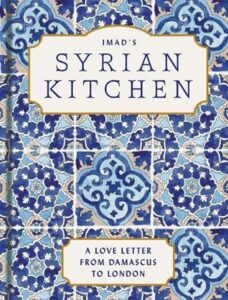 Imad’s Syrian Kitchen by Imad Alarnab is a cookbook of Syrian recipes – ranging from the basics of Syrian cooking, making your own spice mixes, starters, mains, and desserts. The cookery chapters are interspersed by chapters of Imad’s own experience of fleeing Syria, arriving to the UK, his experience of the UK asylum system, being granted protection and his journey to British citizenship and making London his new home. At one level you can pop in and out of the book for recipes and connect with the Syrian people through their cuisine and the aromas in your kitchen as you cook. On another level, you can connect with the Syrian people through the experiences shared by Imad of the struggles of arriving to the UK and finding his new home here. The book (and hopefully the cooking you are inspired to make) is a reminder of the joys and gifts that refugees bring with them that enrich our own lives and communities.
Imad’s Syrian Kitchen by Imad Alarnab is a cookbook of Syrian recipes – ranging from the basics of Syrian cooking, making your own spice mixes, starters, mains, and desserts. The cookery chapters are interspersed by chapters of Imad’s own experience of fleeing Syria, arriving to the UK, his experience of the UK asylum system, being granted protection and his journey to British citizenship and making London his new home. At one level you can pop in and out of the book for recipes and connect with the Syrian people through their cuisine and the aromas in your kitchen as you cook. On another level, you can connect with the Syrian people through the experiences shared by Imad of the struggles of arriving to the UK and finding his new home here. The book (and hopefully the cooking you are inspired to make) is a reminder of the joys and gifts that refugees bring with them that enrich our own lives and communities.
Life and Death in One Breath by Sadhguru
Abdul, a refugee friend
 “Life and Death in One Breath” is a book by Sadhguru that delves into the relationship between life and death.
“Life and Death in One Breath” is a book by Sadhguru that delves into the relationship between life and death.
The book provides an incredible vision that stems from Sadguru’s great inner experiences.
The central view of the book is the concept that life and death are the two sides of the same coin. It suggests that by embracing both life and death, we can break free from the bonds of the self-made struggles we face in our lives.
One of the most memorable quotes from the book is Sadguru’s reflection on death: “Death is a cosmic joke. If you get the joke, when you fall on the other side, it will be wonderful. If you don’t get the joke when you are here you fear the other side, and when the other side comes, you just don’t know what it is about. If death becomes a laughing matter in your life, you can live your life absolutely, totally.”
I found it fascinating to learn that life and death happen simultaneously in our bodies. For centuries we have believed that death is the final event of our lives, but the book argues that death is a gradual process that begins with our birth.
The Colony by Audrey Magee by Audrey Magee
Aidan, Interim Deputy Director
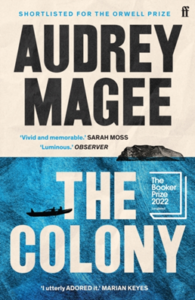 This is a novel set on a remote island off the west coast of Ireland in 1979. This year was the peak of the Troubles and the novel charts Anglo-Irish history, particularly the preservation of the Irish language. I found it an incredibly thought-provoking book about not just the history of conflict on the British and Irish Isles but that of British colonialism far and wide.
This is a novel set on a remote island off the west coast of Ireland in 1979. This year was the peak of the Troubles and the novel charts Anglo-Irish history, particularly the preservation of the Irish language. I found it an incredibly thought-provoking book about not just the history of conflict on the British and Irish Isles but that of British colonialism far and wide.
The story involves a London artist, coming to paint the cliffs, and a French linguist who is charting and recording this surviving outpost of spoken Irish. They despise each other immediately whilst trying to influence the islanders who, themselves, are both suspicious yet also drawn to the wider world beyond the small island.
The islanders do listen to the news about the Troubles, and these stories of the killings, are briefly scattered throughout the narrative. This story is being told during a period long before the peace agreements came in during the 1990’s, agreements which now feel fragile and under threat again. These brief passages, describing the deaths from sectarian violence in Northern Ireland, are harrowing and evoke painful memories for me of watching the news as a child growing up in England.
I enjoyed exploring themes around the nature and balance of power. It’s both a beautiful and haunting book and left me feeling like I’d been on a rollercoaster of a tale, one moment gentle and sorrowful, the next violent and tragic.
Wisdom from Black Spirituality for People of Faith by Tarry Awhile
Dunstan, Special Projects Coordinator
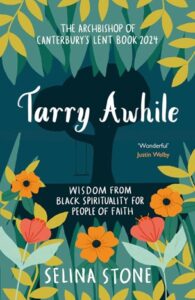 I am currently reading Tarry Awhile, Wisdom from Black Spirituality for People of Faith by Selina Stone. While I can sometimes find religious language rather difficult to understand, this book is made up of a language which I find to be very nourishing, heartening, and beautiful. Through the telling of stories and gentle meditations on themes such as ‘Spirit’, ‘Quiet’ and ‘Healing’, the author introduces the reader to black faith and spirituality. This is – the author affirms – at heart about ‘an encounter that surprises us in unexpected places…an encounter with the Spirit who empowers the unlikely person; stimulates singing, shouting and quiet; brings healing and turns weeping into joy’ (p. 3).
I am currently reading Tarry Awhile, Wisdom from Black Spirituality for People of Faith by Selina Stone. While I can sometimes find religious language rather difficult to understand, this book is made up of a language which I find to be very nourishing, heartening, and beautiful. Through the telling of stories and gentle meditations on themes such as ‘Spirit’, ‘Quiet’ and ‘Healing’, the author introduces the reader to black faith and spirituality. This is – the author affirms – at heart about ‘an encounter that surprises us in unexpected places…an encounter with the Spirit who empowers the unlikely person; stimulates singing, shouting and quiet; brings healing and turns weeping into joy’ (p. 3).
Slow Horses by Mick Herron
Michael, Senior Legal Officer
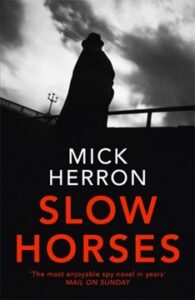 I can’t recommend Mick Herron’s Slow Horses spy series enough. The Slow Horses in question are spies, part of MI5, but a team of losers, misfits and failures set apart from the rest of MI5 as useful scapegoats and a cheaper alternative to redundancy payouts. Their boss, Jackson Lamb is cynical, obnoxious, and lacking all social skills but sharp enough to keep himself, and most of his team, ahead of the machinations of Whitehall, the security services, and politicians. All of whom are more of a threat than any terror group or external enemy. The latest “The Secret Hours” is mostly a prequel and like a lot of Le Carre or other classics takes us back to Berlin, but it is Berlin after the end of the cold war – a bit unnerving when you realise that’s now already well over 30 years ago. For a trash spy novel there’s a lot there – Herron’s take on how we are governed today- the systems and the people – are disturbingly accurate and the characterisation and plot twists draw you in and any initial distaste for Lamb’s performative misanthropy turn worryingly to respect or worse, admiration. Just as well we don’t get to come to work as our favourite character for World Book Day.
I can’t recommend Mick Herron’s Slow Horses spy series enough. The Slow Horses in question are spies, part of MI5, but a team of losers, misfits and failures set apart from the rest of MI5 as useful scapegoats and a cheaper alternative to redundancy payouts. Their boss, Jackson Lamb is cynical, obnoxious, and lacking all social skills but sharp enough to keep himself, and most of his team, ahead of the machinations of Whitehall, the security services, and politicians. All of whom are more of a threat than any terror group or external enemy. The latest “The Secret Hours” is mostly a prequel and like a lot of Le Carre or other classics takes us back to Berlin, but it is Berlin after the end of the cold war – a bit unnerving when you realise that’s now already well over 30 years ago. For a trash spy novel there’s a lot there – Herron’s take on how we are governed today- the systems and the people – are disturbingly accurate and the characterisation and plot twists draw you in and any initial distaste for Lamb’s performative misanthropy turn worryingly to respect or worse, admiration. Just as well we don’t get to come to work as our favourite character for World Book Day.
Shoe Dog by Phil Knight
Eileen, Senior Communications and Development Officer
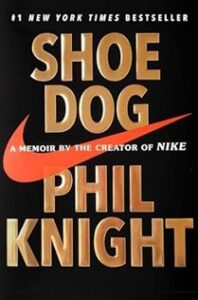 I’d never given any thought to the origin of trainers, and I wouldn’t have read this book if a friend hadn’t given it to me – however, I’m really glad I did.
I’d never given any thought to the origin of trainers, and I wouldn’t have read this book if a friend hadn’t given it to me – however, I’m really glad I did.
Phil Knight’s memoire of his dogged endeavour to create the perfect running shoes, to source the materials, discover the factories in far-flung corners of the world, teaching them how to get the products right, is entertaining, inspiring, and often amusing. It’s so hard to build something new, from scratch. He had to overcome such adversity – especially from banks who wouldn’t back him – they were one of his major difficulties to overcome, how they must be kicking themselves now!
Knight candidly shares intimate details about his family and upbringing, how they shaped and helped him, with tenderness and warmth. His leadership style is also almost a story of family, with its ups and downs – he’s honest and humble about his mistakes. Yet he gets the best out of his team, who truly became like family to him and generally show him and Blue Ribbon astonishing loyalty. He let them develop things in their own way: “Don’t tell people how to do things, tell them what to do and let them surprise you with their results.”
This loyalty allowed him – with their backing – to take huge risks. Loyalty and belief led them to work incredibly hard, and we know how the story ends – or continues. This book is so positive and easy to read. It’s uplifting and encouraging, especially if you’ve had a hard day and things feel impossible. Hard work and good colleagues pulling together, doing their best, day in day out, will ultimately, like that Nike whoosh logo, leave a mark on the world.
The Island of Missing Trees by Elif Shafak
Stephanie, Destitution Caseworker
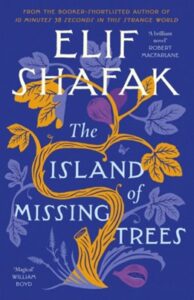 From a divided Cyprus in 1974 to London in the late 2010s, The Island of Missing Trees follows the forbidden love of Kostas and Defne, Greek and Turkish Cypriots. The story is told from a number of perspectives, including the perspective of a fig tree!
From a divided Cyprus in 1974 to London in the late 2010s, The Island of Missing Trees follows the forbidden love of Kostas and Defne, Greek and Turkish Cypriots. The story is told from a number of perspectives, including the perspective of a fig tree!
It is beautifully written, bringing to life the characters, their worlds and nature itself. It explores identity and belonging, stories and meaning, history and trauma. I particularly enjoyed nature’s role in the novel. It was my first read of 2024, and I was fully immersed from the start.
Wandering Souls by Cecile Pin
Victoria, Senior Communications & Engagement Officer
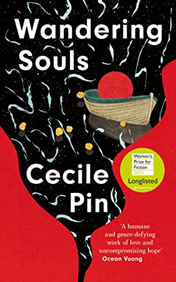 A friend gave me a copy of Wandering Souls for my birthday last year. When I look for a book for myself, I read the blurb thoroughly before deciding whether to read it. But when I am given a book, I often dive right in, without properly reading the blurb – I just hope that friends know my taste and that I will like it!
A friend gave me a copy of Wandering Souls for my birthday last year. When I look for a book for myself, I read the blurb thoroughly before deciding whether to read it. But when I am given a book, I often dive right in, without properly reading the blurb – I just hope that friends know my taste and that I will like it!
So, when I began reading, I knew the novel was about a refugee journey, but not where or when it was set. The novel starts in Vietnam in 1978, as 16-year-old Anh, and her two brothers, Minh, 13, and Thanh, 10, set out for Hong Kong, and I quickly discovered I was reading a story aligned with the setting up of JRS in 1980 “to respond to the plight of Vietnamese refugees”. I wonder if my friend had made that connection either – talk about bringing work home! Anh’s parents and four other siblings follow later, but never make it. The ‘about us’ page of the JRS International website describes how:
“Many did not survive the journey; they were killed by pirates or drowned because of storms and rough seas.”
One of the first chapters describes a particularly harrowing example of people not surviving the journey to seek safety – the Koh Kra massacre in 1979.
After learning about their parents’ deaths, Anh, Minh, and Thanh are held in a refugee camp in Hong Kong for a while, and Anh takes on the role of guardian to her younger brothers. They eventually find themselves in Thatcherite Britain, where Pin skilfully paints a picture of the confusion, xenophobia, and the hostility they encounter. It was striking how that same picture can describe the experiences of many refugees in the UK forty years later.
“Much has changed since Fr Pedro Arrupe SJ founded JRS, but our mission to accompany, serve, and advocate for refugees and displaced people remains the same: “Home is where we all begin, and what we want all people to find.”
Aside from the connections with my work, I was also struck by the voices that emerge in Pin’s novel. The story mostly follows Anh as she looks after her brothers and tries to make a home in the UK. But there are other voices too: her little brother Dao (now a ‘wandering soul’, having died at sea, away from home), fictional (but believable) newspaper excerpts and accounts, a writer struggling with the history she is learning.
Wandering Souls depicts the challenges the siblings encounter setting up life again after seeking sanctuary, but also describes beautiful moments of connection with others. It’s also a powerful reminder of the voices we choose to listen to in refugee stories – particularly resonating with me in my communications work. I hope you’ll find it thought provoking too.
 The next time you’re at the centre, why not check out our ever growing ‘book-swap shelf’?
The next time you’re at the centre, why not check out our ever growing ‘book-swap shelf’?
And please do share with us any of your favourite books! We’d love to hear from you!

